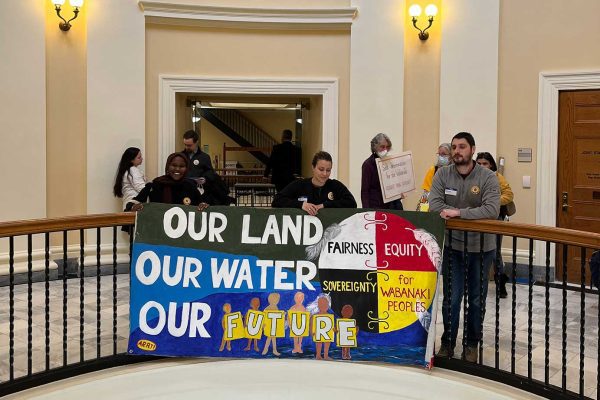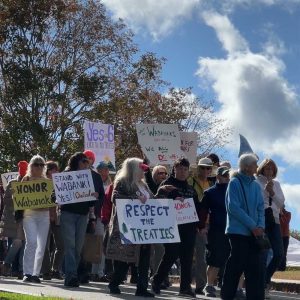We all depend on a clean, healthy environment and are united by our love for the Maine outdoors. We must use this unity to ensure equity and fairness for all. It’s this obligation to make the outdoors more equitable and the recognition of past injustices toward Wabanaki tribes that is motivating the Natural Resources Council of Maine’s (NRCM) support for tribal sovereignty.

The Wabanaki Alliance State House Action Day (photo by JCaldwell/NRCM)
The mission of NRCM is to protect, restore, and conserve the woods, waters, wildlife, and communities of the place we now call Maine. In that work, we recognize and honor the Mi’kmaq Nation, the Houlton Band of Maliseet Indians, the Passamaquoddy Tribe, and the Penobscot Nation, who have stewarded these lands for millennia, long before our organization began. NRCM will continue to prioritize tribal sovereignty and self-determination in the Legislature and work with the Wabanaki people and their many allies to build a healthier, more just future.
We are honored to have worked with the Wabanaki Nations to protect the lands and waters we all depend on: to restore water quality and the health of Maine’s rivers and to remove obsolete dams and other obstacles that have prevented sea-run fish from reaching vital upstream habitat. We stand firmly with the Wabanaki people to oppose a polluting mine in the Katahdin region near tribal lands and pristine fish habitat, just as we worked with them to stop the dumping of out-of-state waste in Maine, among other accomplishments we’ve achieved together.
But the Wabanaki people have faced centuries of broken treaties and genocide and been denied sovereignty for too long. Without the legally protected right to self determination, the tribes have limited regulatory control over the natural resources that impact their communities and livelihood. For example, the Penobscot River is a vital resource for the Penobscot Nation, but the Nation has been unable to address persistent pollution of the river due to legal barriers imposed by the state.
Because the Wabanaki Nations in Maine are not treated as sovereign nations, they have limited access to federal funding and programs that are available to all 570 other tribes in the United States. Wabanaki Nations in Maine are, unfortunately, in a uniquely marginalized position that has prevented them from accessing at least 151 federal laws passed since 1980 that are beneficial to Indian Nations.
It has had a direct, negative impact on the livelihoods of Wabanaki people in Maine, as shown by a Harvard Kennedy School report that found the average per capita income of Wabanaki Nations has risen a mere 9% since 1989, relative to a rise of 61% for members of all other federally recognized tribes in the US. Without access to these resources, it is all the more challenging for Wabanaki Nations in Maine to effectively support their people, protect their land, and engage in traditional practices.

NRCM staff and others gathered at the Maine State House for a rally in support of tribal sovereignty on Indigenous Peoples’ Day 2023. (Photo by CDurrant/NRCM)
We also recognize that the conservation community has not always been a good partner to Indigenous tribes, and that includes NRCM’s work here in Maine. Over the years, the conservation of land for environmental protection has not prioritized tribal voices and needs, and in many cases has actively excluded tribal members from participation or access.
Despite these injustices, descendant communities of the Wabanaki maintain spiritual, cultural, and physical connections to these lands and deserve to have their full rights to govern restored.
NRCM and the Wabanaki Nations in Maine are often woven together in common cause as we seek to nurture healthy environments and communities. For instance, climate change is threatening the livelihoods of Wabanaki people and many other Mainers because of impacts on agriculture, fisheries, forests, and wildlife. We have a common goal in making sure Maine communities have the resources needed to adapt to climate change and protect land, water, and wildlife.
Our commitment to tribal sovereignty includes active reflection and continued learning to ensure that our organization grows to meet this critical moment and continues to foster positive relationships with tribal communities as we work together to make this place that we love more equitable and less vulnerable.
As part of this learning journey, NRCM’s staff have participated in Wabanaki Reach’s Decolonizing Conservation training and have actively sought tribal perspective in legislation or issues on which we are working. For example, passage of a bill to expand Maine’s ecological reserve system included language to allow traditional uses by Wabanaki Nations.
One important reason why NRCM is working alongside the Wabanaki people to restore sovereignty is quite simply because we were invited to join this effort, and we want to be good partners. As part of this commitment, NRCM is a proud member of the Wabanaki Alliance and stands in solidarity as it seeks to secure full sovereignty of the Wabanaki in Maine in the State Legislature. We are advocating in support of legislation (LD 2007) that will help Wabanaki Nations achieve sovereignty and will continue to share information with our supporters about how they can help, too.
Relationships are everything to our advocacy work. The Wabanaki people have lived here far longer than we have. We trust their knowledge of the land and its needs. We seek to learn from them and join them as we work to achieve our mission of protecting the nature of Maine.
We hope that you will join us in supporting this important cause.
Learn more and get involved:
- Wabanaki Alliance website: https://wabanakialliance.com/
- Wabanaki Alliance take action page: https://www.wabanakialliance.com/stand-with-wabanaki/
- Wabanaki Reach: https://www.wabanakireach.org/
—By NRCM’s Diversity, Equity, Inclusion, and Justice Committee











Leave a Reply